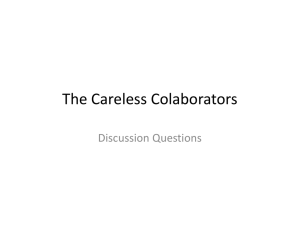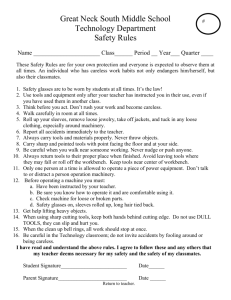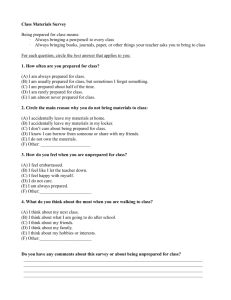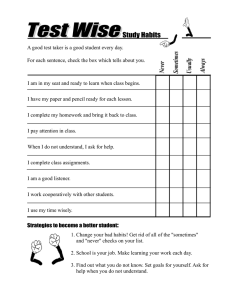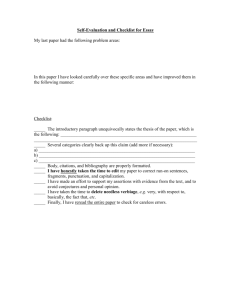Strategies for Success Academic Strategies The Test Analysis
advertisement
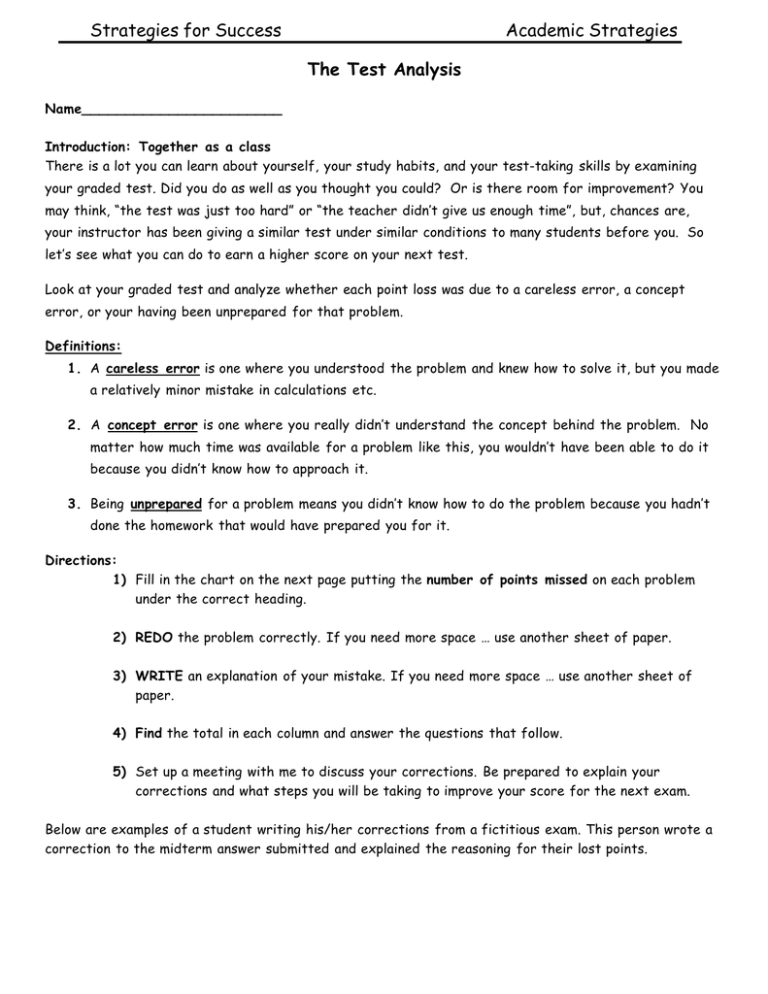
Strategies for Success Academic Strategies The Test Analysis Name_______________________ Introduction: Together as a class There is a lot you can learn about yourself, your study habits, and your test-taking skills by examining your graded test. Did you do as well as you thought you could? Or is there room for improvement? You may think, “the test was just too hard” or “the teacher didn’t give us enough time”, but, chances are, your instructor has been giving a similar test under similar conditions to many students before you. So let’s see what you can do to earn a higher score on your next test. Look at your graded test and analyze whether each point loss was due to a careless error, a concept error, or your having been unprepared for that problem. Definitions: 1. A careless error is one where you understood the problem and knew how to solve it, but you made a relatively minor mistake in calculations etc. 2. A concept error is one where you really didn’t understand the concept behind the problem. No matter how much time was available for a problem like this, you wouldn’t have been able to do it because you didn’t know how to approach it. 3. Being unprepared for a problem means you didn’t know how to do the problem because you hadn’t done the homework that would have prepared you for it. Directions: 1) Fill in the chart on the next page putting the number of points missed on each problem under the correct heading. 2) REDO the problem correctly. If you need more space … use another sheet of paper. 3) WRITE an explanation of your mistake. If you need more space … use another sheet of paper. 4) Find the total in each column and answer the questions that follow. 5) Set up a meeting with me to discuss your corrections. Be prepared to explain your corrections and what steps you will be taking to improve your score for the next exam. Below are examples of a student writing his/her corrections from a fictitious exam. This person wrote a correction to the midterm answer submitted and explained the reasoning for their lost points. Strategies for Success Problem 1 Careless Error Academic Strategies Concept Error Unprepared Correction: A point was taken off because I forgot the negative sign on my final answer 2 Correction: 3 points were taken off because I did not follow the order of operations. I incorrectly subtracted 3-5, multiplied by 9 and got 18 3 Correction: I missed 6 points because I left the problem blank. Strategies for Success Problem 1 2 3 4 5 Careless Error Academic Strategies Concept Error Unprepared Strategies for Success Problem 6 7 8 9 10 Careless Error Academic Strategies Concept Error Unprepared Strategies for Success Academic Strategies To be discussed in meeting or in groups during class-time: 1. In which column did you have the most missed points? 2. What does this tell you about yourself? 3. What can you learn from this exercise? First, consider at the Careless Error points. Careless errors are often caused by hurrying during a test or by lack of concentration due to test anxiety or overconfidence. So here are some strategies that have worked for other math students: • Do the easiest problems first. When you first start on a test, look it over from beginning to end and note which problems will be easiest for you. Do all those problems first, to ensure that you don’t leave an easy problem blank, just because it is at the end of the test. Finishing the problems you find easy will help build your confidence! Then go through the rest of the test from beginning to end. • Work carefully and neatly. As you do each problem try to focus on one step at a time. • Review each problem to look for careless errors, when you finish the test. Arithmetic mistakes and sign errors should be found and corrected before you turn your test in. • Whenever possible check the problem. A lot of points can be gained by slowing down and being careful! What are two things you will do next time to prevent careless errors? 1. 2. Now take half of your “careless” points and add them back to your test total. o What could your test grade have been? _____ o Would that have changed your A/B/C grade? Strategies for Success Academic Strategies Now consider the Concept Error points. A high total in this column tells you that you didn’t understand the concepts very well. As you do your work day–to– day you might think you “get it”, but you don’t always verify that you understand each problem in the homework completely. You may understand a math concept for the two hours you’re working on the homework problems, but forget it by the next day. • Review earlier sections. Make sure to spend some homework time reviewing earlier sections, instead of saving all the review for test time. • Get the help you need immediately! Math concepts build on each other. Each new idea is based on many previous concepts. Make sure you get the help you need immediately, as soon as you find yourself beginning to feel lost, so that, the confusion doesn’t compound itself – otherwise it can become like a snowball, getting bigger and bigger as it rolls through the snow. If the total loss due to concept errors is fairly large, find out where you can get the help you need. Your school has places available just for you to get help with your math. List two places you can go to get help with your math: 1. 2. What about the points lost because you were Unprepared? Why did you take the test without being fully prepared? Oftentimes, activities and responsibilities in life interfere with good intentions about being diligent in attending class, reading the textbook, and doing all the assignments. It may be time to: • Re-examine your weekly schedule and make sure you are devoting a sufficient amount of time to this class. Lay out a time management grid of your schedule making sure to schedule your math study time. • Re-commit yourself to succeeding in this class; think about your college and career goals and remind yourself of how this course helps you get one step closer to achieving them. • List two steps you will take to remedy being unprepared 1. 2.
